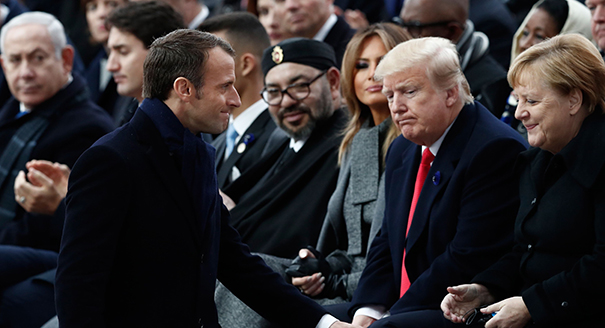Kristina Kausch | Senior resident fellow at the German Marshall Fund of the United States
Yes, increasingly. While the trans-Atlantic relationship has been strained over a wide array of issues, divergences over key Middle Eastern policy dossiers have been decisive in driving European and U.S. leaders apart. Although the core interests of the European Union and the United States in the Middle East remain aligned, trans-Atlantic fallouts over Iran, Palestine, and most recently Syria, have exposed a profound schism over the best way to pursue them.
European leaders have gone through three phases of dealing with Trumpism—namely denial, waiting it out, and active opposition. German Foreign Minister Heiko Maas demanded last August that the Europeans should consciously balance U.S. President Donald Trump’s irresponsible policies, intervening as “a counterweight where the U.S. crosses red lines.” They already did so in response to Trump’s tough love approaches to Iran and Palestine, respectively. Europe’s diverging course on Iran reflects both disagreement over the most promising way to contain Tehran’s aggressive expansionism as much as it does a fundamentally different approach to international diplomacy. The vocal European opposition to the U.S. troop withdrawal from Syria is set to continue a pattern of balancing off what the Europeans consider to be Washington’s incendiary policy positions in an already inflamed Middle East.
François d’Alançon | Foreign correspondent for the La Croix newspaper in Paris
Europeans and Americans are increasingly at odds when it comes to the Middle East but the European side is not offering an alternative way for shaping the geopolitical competition unfolding in the region. Europe is politically divided and lacking the military capacity to act efficiently without U.S. support.
On Syria, following the partial reversal of President Donald Trump’s unilateral withdrawal of all 2,000 U.S. troops, France and the United Kingdom, the only European nations with troops on the ground, are currently discussing with the United States the terms of their deployment. However, the improvised stopgap measure by the White House is unlikely to restore the confidence undermined by Trump’s transactional approach to foreign policy.
On Iran, the new unilateral U.S. demand that Europe should leave the nuclear deal with Tehran and shut down the mechanism set up for facilitating trade with Iran—Europe’s most substantial step to save the deal—mystified the European allies. The former Swedish prime minister, Carl Bildt, saw it as an attempt to “create an excuse for a direct and open confrontation with Iran.” Whether Europe will succeed in preventing a slide toward another war in the region remains to be seen.
Judy Dempsey | Nonresident senior associate, nonresident senior fellow, and editor in chief of Strategic Europe at Carnegie Europe
The United States have never counted on Europe as a serious, engaged player in the Middle East. The Europeans have completely depended on Washington to deal with the region. This could change. Watch Syria. Trump may ask the Europeans to provide security and troops once the U.S. pulls out. The Europeans would be hard-pressed to accept such a request. Refusal would mean more tensions in the trans-Atlantic relationship. Watch too what will follow the European Union (EU)-Arab League summit that took place earlier this week. Because migration is so toxic in Europe, the EU is now making stabilization in the Middle East a priority. The rhetoric of values, the rule of law, and a free media have given way to realpolitik, just as it was before the Arab Spring. The leaders in the region, particularly Egyptian President Abdel-Fattah al-Sisi, know authoritarian regimes have support from Brussels and Washington. In that sense maybe the United States isn’t losing Europe.
Georges Fahmi | Research fellow in the Middle East Directions program at the Robert Schuman Center for Advanced Studies at the European University Institute in Florence
The Trump administration does not want to discuss its strategy in the Middle East with European states. Instead, it has demanded that Europe follow the American lead, as has been the case with the Iranian nuclear deal for example. Many European states refuse to do so. However, these states have also been unable to put forward a strategy of their own. European policymakers perceive the Trump administration as one that is temporary and exceptional, which will soon be replaced by an administration with a different approach. This would allow the U.S. and Europe to come together again and agree on a common policy toward the region. Former vice president Joe Biden’s remark “We will be back” at the Munich Security Conference two weeks ago played to European desires. Until then, however, Europe will be reluctant to follow U.S. policy toward the region, but also to put forward a strategy of its own. It will prefer simply to wait.








